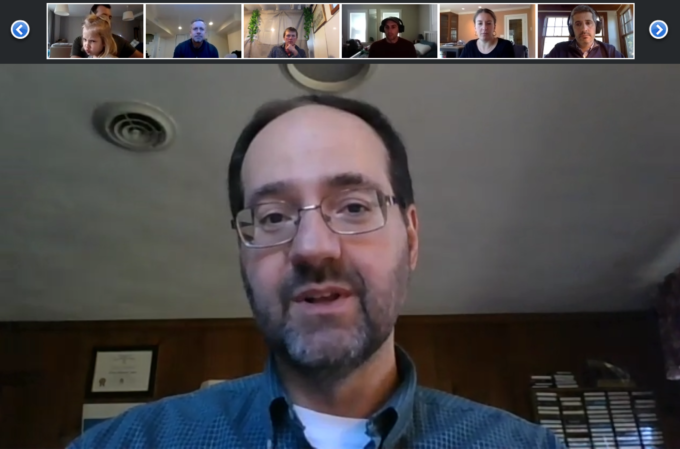Three investors and more than 70 Greentown Labs community members connected virtually in late March to discuss topics that are top of mind for many startups right now: how to build company resilience, manage investor relationships, and fundraise in an uncertain economy.
The event, which kicked off Greentown’s virtual Investor Speaker Series, featured panelists who are deeply rooted in the cleantech ecosystem: Mitch Tyson, partner at Clean Energy Venture Group, co-founder of the Northeast Clean Energy Council, and Greentown Board Member; Matthew Nordan, managing director of Prime Impact Fund and Greentown Board Member; and Tibor Toth, managing director of investments at the Massachusetts Clean Energy Center, a long-time partner of Greentown.
Here is the panelists’ top advice for startups navigating this unprecedented time:
Investors’ biggest focus right now is your leadership—and that should be your focus, too.
Everyone will be evaluating your company’s leadership right now—your investors, your customers, and your employees.
Tyson borrowed a direction from flying in an airplane to explain how to get through this difficult time: put on your own oxygen mask first. Make sure that you are all right, then check in with your employees. They need to feel safe, supported, valued, and motivated during this time.
Then, turn to your business and check what Tyson calls its “vital signs.” Check in with your investors, customers, suppliers, and grant statuses. Get as much data as you can, and then do your best to process it calmly and analytically.
Investors are looking at which companies in their portfolios are going to survive this crisis and will be throwing their support behind those with strong leaders and teams, the panelists said.
“This is an opportunity for investors to see how you handle a crisis,” Tyson said. “We normally don’t have that. We are watching you take one of the toughest tests you’re probably going to see in your lifetime, and we get a chance to evaluate which CEOs and which executive teams and which employee teams are up to the task.”
It’s unclear how long this period will last. That means drawing your backup plans.
Nordan emphasized that this time is, at its core, a public health crisis; as opposed to the 2008 financial crisis, where the problem lay within our economic system, if COVID-19 disappeared tomorrow then much of our economy could return to business as usual.
The problem, however, is that we don’t know how long this health crisis will last, he explained. Just as startups are navigating this period without all the information they wish they had, so too are venture capitalists (VCs), angel investors, and corporates.
In part because of this uncertainty, VCs and angel investors are both less likely to make new investments for the foreseeable future, the panelists said.
But what if you were planning on fundraising? Nordan suggests going to the drawing board and drafting three-, two-, and one-year plans for how you could survive without raising capital. The three-year plans virtually never work, he acknowledged, but said playing out these three scenarios is a useful exercise.
“The point of the three-year plan is to illuminate the things that break you and which levers you can pull and knobs you can turn versus which you can’t,” Nordan said. “Figure out what things you can change and then come up with a strategy.”
It is key to manage the relationships you have with your current investors, he emphasized, giving insight into how investors are thinking about the companies that are already in their portfolios. Nordan has looked into four main factors affecting how this time period will impact each of the companies he’s invested in: their balance sheet, dependence on working in a lab, access to facilities and resources, and reliance on third parties for milestones and cash flow.
If you can’t fundraise right now, Tyson encourages you not to view this as lost time—instead, focus on what you can do that will make you stronger in the long term, such as customer discovery.
Communication is key.
The panelists were extremely clear: reach out to your investors right now if you haven’t already.
“You need to be communicating with your investors—they need to know what you’re doing and how you’re managing,” Tyson said. “If you have to raise money to stay alive, it’s your existing investors that you’re going to need to go to first, because they have more of a stake in your success.”
Despite all the economic challenges and uncertainty resulting from COVID-19, Toth and Tyson underlined that cleantech investors’ goals haven’t changed.
“There will definitely be some lagging effects, but fundamentally, everyone is in this sector for more than just generating a financial return,” Toth said. “Everybody is committed to this mission—climate impact and working together to build a strong industry. This hopefully will provide a much faster resumption to normalcy.”
“We’re in this because we believe in entrepreneurs and we believe in the cause, and we want to help,” Tyson said. “We’re people too, and we are with you in this.”
The Investor Speaker Series is part of Greentown Labs’ commitment to support startups more than ever as they navigate the impacts of COVID-19. To learn more about these efforts, follow us on Twitter or check out our blog. If you’re interested in receiving a recording of the panel, please reach out to us at hello@greentownlabs.com.


